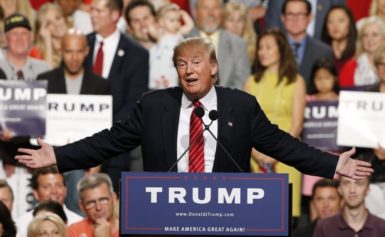
A group of Donald Trump supporters at a rally in Manassas, Virginia on Dec. 2, 2015. Photo courtesy of WTOP.com
Since announcing plans to run for president back in June 2015, real estate tycoon Donald Trump has sprinted to the front of the 2016 presidential race. On his rise to the top, however, he has managed to ruffle a few feathers along the way. From his inflammatory remarks about Mexican immigrants to his controversial idea to ban Muslims from entering the U.S., Trump’s overwhelming success in this year’s presidential election has many people scratching their heads. Who are Trump’s supporters, and why on earth are they backing him?
Two scientific studies may have just answered this burning question.
According to the Washington Post, two new studies revealed that racial anxiety is the driving factor of support for the lone GOP presidential candidate. The report also confirms that economic concerns don’t have as much influence as previously thought.
The first study, conducted by political scientist Philip Klinker, examined data from the 2016 American National Election Study and compared voter feelings/attitudes toward Trump and Democratic contender Hillary Clinton, the news site reports. During his research, Klinker also analyzed how economic opinions, racial attitudes and demographic variables could influence an individual’s feelings toward each candidate.
“My analysis indicates that economic status and attitudes do little to explain support for Donald Trump,” Klinker wrote in a Vox article published last week. His study found that “those who express more resentment toward African Americans, those who think the word ‘violent’ describes Muslims well, and those who believe President Obama is a Muslim have much more positive views of Trump compared with Clinton.”
Measuring both racial attitudes and resentment among voters, Klinker’s survey analyzed responses to statements like:
- “Over the past few years, black people have gotten less than they deserve.”
- “It’s really a matter of some people not trying hard enough; if black people would only try harder they could be just as well off as white people.”
- “Generations of slavery and discrimination have created conditions that make it difficult for black people to work their way out of the lower class.”
Strong responses to the racially charged statements are what helped the political scientist conclude that racial attitudes were the determining factor for Trump support, the Washington Post reports.
According to Klinker’s research, “moving from the least to the most resentful view of African Americans increases support for Trump by 44 points, those who think Obama is a Muslim (54 percent of all Republicans) are 24 points more favorable to Trump, and those who think the word “violent” describes Muslims extremely well are about 13 points more pro-Trump than those who think it doesn’t describe them well at all.”
A similar study conducted by the Washington Post also investigated whether “shared concern about white status” or economic anxiety fueled overwhelming support for Trump. In conjunction with ABC News, the publication ran a national poll inquiring into voter economic status and racial attitudes. The results of their study differed slightly from Klinker’s.
According to the Washington Post, their findings suggest that both economic concerns and racial anxieties are driving support for Trump.
“…Both economic troubles and feelings that whites are losing out have a strong – and independent – impact on Trump’s supporters,” the Washington Post states. “Republicans who are worried about maintaining their economic situation are more likely to support Trump, regardless of whether they think that whites losing out to other groups is a big problem. Those who voiced concerns about white status appeared to be even more likely to support Trump than those who said they were struggling economically, but the results did not clearly show which concern was more important among Trump’s coalition.”
This information isn’t new to critics of Trump’s antics and narrow-minded views. In fact, Vermont Sen. Bernie Sanders suggested that racial concerns could be behind Trump supporters’ racial sentiments during a “Face the Nation” interview last year, the Washington Post reports. Sanders asserted that Trump had “taken that [economic] anger, taken those fears which are legitimate and converted them into anger against Mexicans, anger against Muslims.”
Despite their slightly differing results, these studies hold that racial attitudes play a crucial role in support for the presumptive GOP presidential nominee.

